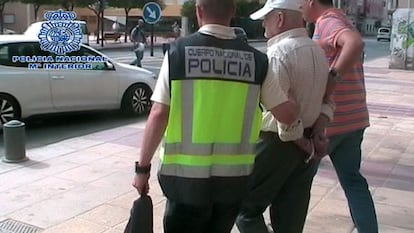Child sex abuser jailed ahead of Moroccan extradition request
Bilateral treaty does not allow for Spain to send citizens to Morocco Courts studying how to prevent impunity after royal pardon was revoked


A Spanish judge on Tuesday ordered escaped pedophile Daniel Galván to be remanded without the possibility of bail after his capture a day earlier in Murcia. Prosecutors had also recommended Galván be held unconditionally due to the serious flight risk he represents.
Galván was arrested on Monday after his erroneous release from a Moroccan jail last week. Immediately after he was freed, Galván crossed the border into the Spanish exclave of Ceuta in North Africa. He had been mistakenly included on a list of Spanish prisoners granted a royal pardon by King Mohammed VI as part of the festivities to mark his Feast of the Throne coronation day.
Galván’s case presents Spanish authorities with a delicate problem. He was arrested after an international warrant was issued by Rabat, but he cannot legally be extradited back to Morocco under the terms of a bilateral agreement between the countries and was able to enter Spain as he has no criminal charges pending or record in the country.
Although a Spanish citizen, Galván “was born in Iraq and is an Iraqi native but acquired citizenship when he married a Spanish woman from whom he is now divorced,” Judge Fernando Andreu said in his ruling. “As he has testified, his life has been spent largely in Iraq and Spain but he has also resided in Egypt, Syria, Jordan, the United Kingdom and Morocco, where he was sentenced.”
Galván was convicted in 2011 of sexually abusing 11 children aged between three and 15 and ordered to serve 30 years. He had petitioned Moroccan authorities to be transferred to Spain along with 29 other prisoners but that list was mixed up with one containing 18 requests for a royal pardon. The transfer program was brokered by Spanish intelligence services and King Juan Carlos, who personally met with Mohammed VI in July and discussed the matter.
In theory a royal pardon is irrevocable, but Mohammed VI took the unprecedented step of withdrawing it in Galván’s case. The Moroccan monarch appeared in a live televised address last Friday after protests spread across Rabat. He said had he known Galván’s crimes he would never have issued the pardon.
The courts now have to unpick the complex legal tangle Galván’s erroneous release has created. Morocco has 40 days to provide the documentation for an extradition request, the details of his sentence and the reasons why the pardon was revoked. The Spanish courts then have 40 days to make a decision. If extradition is denied – Galván has requested to remain in Spain and can appeal any decision to the contrary -- the alternative to prevent him from being released is to rule that the royal pardon is void. In that instance, it will be argued that Mohammed VI did not have the necessary information to hand when signing the document. The Spanish courts will then have to study how to adjust the sentence handed down in Morocco to national laws.
Tu suscripción se está usando en otro dispositivo
¿Quieres añadir otro usuario a tu suscripción?
Si continúas leyendo en este dispositivo, no se podrá leer en el otro.
FlechaTu suscripción se está usando en otro dispositivo y solo puedes acceder a EL PAÍS desde un dispositivo a la vez.
Si quieres compartir tu cuenta, cambia tu suscripción a la modalidad Premium, así podrás añadir otro usuario. Cada uno accederá con su propia cuenta de email, lo que os permitirá personalizar vuestra experiencia en EL PAÍS.
¿Tienes una suscripción de empresa? Accede aquí para contratar más cuentas.
En el caso de no saber quién está usando tu cuenta, te recomendamos cambiar tu contraseña aquí.
Si decides continuar compartiendo tu cuenta, este mensaje se mostrará en tu dispositivo y en el de la otra persona que está usando tu cuenta de forma indefinida, afectando a tu experiencia de lectura. Puedes consultar aquí los términos y condiciones de la suscripción digital.








































